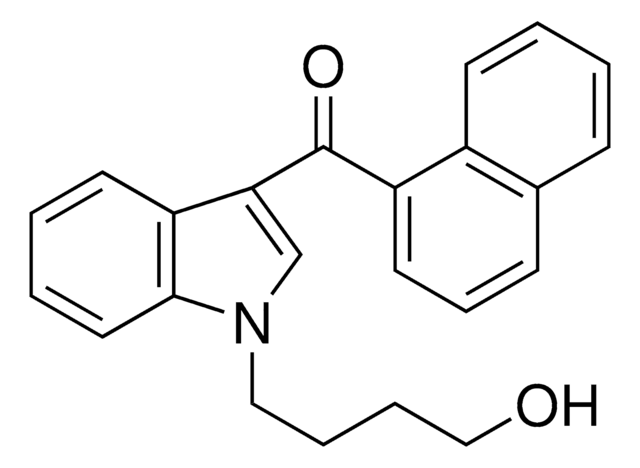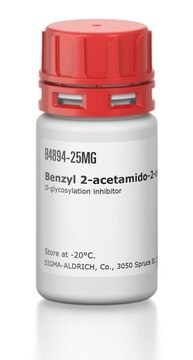SML1620
NGI-1
≥95% (HPLC)
Synonym(s):
5-[(Dimethylamino)sulfonyl]-N-(5-methyl-2-thiazolyl)-2-(1-pyrrolidinyl)-benzamide, ML414
Sign Into View Organizational & Contract Pricing
All Photos(1)
About This Item
Empirical Formula (Hill Notation):
C17H22N4O3S2
CAS Number:
Molecular Weight:
394.51
UNSPSC Code:
12352200
NACRES:
NA.77
Recommended Products
Quality Level
assay
≥95% (HPLC)
form
powder
color
white to beige
solubility
DMSO: 5 mg/mL, clear (warmed)
storage temp.
2-8°C
SMILES string
[S](=O)(=O)(N(C)C)c1cc(c(cc1)N3CCCC3)C(=O)Nc2[s]c(cn2)C
InChI key
QPKGRLIYJGBKJL-UHFFFAOYSA-N
Biochem/physiol Actions
NGI-1 (ML414) is an inhibitor of Asparagine (N)-linked glycoslysation.
NGI-1 (ML414) is an inhibitor of Asparagine (N)-linked glycoslysation. NGI-1 inhibits the oligosaccharyltransferase, preventing the attachment to the protein. NGI-1 has been shown to induce senescence in receptor tyrosine kinase dependent tumors.
Storage Class
11 - Combustible Solids
wgk_germany
WGK 3
Choose from one of the most recent versions:
Certificates of Analysis (COA)
Lot/Batch Number
Don't see the Right Version?
If you require a particular version, you can look up a specific certificate by the Lot or Batch number.
Already Own This Product?
Find documentation for the products that you have recently purchased in the Document Library.
Angelyn Larkin et al.
Biochemistry, 50(21), 4411-4426 (2011-04-22)
Asparagine-linked glycosylation involves the sequential assembly of an oligosaccharide onto a polyisoprenyl donor, followed by the en bloc transfer of the glycan to particular asparagine residues within acceptor proteins. These N-linked glycans play a critical role in a wide variety
Danielle Skropeta
Bioorganic & medicinal chemistry, 17(7), 2645-2653 (2009-03-17)
In a series of investigations, N-glycosylation has proven to be a key determinant of enzyme secretion, activity, binding affinity and substrate specificity, enabling a protein to fine-tune its activity. In the majority of cases elimination of all putative N-glycosylation sites
Cecilia Lopez-Sambrooks et al.
Nature chemical biology, 12(12), 1023-1030 (2016-10-25)
Asparagine (N)-linked glycosylation is a protein modification critical for glycoprotein folding, stability, and cellular localization. To identify small molecules that inhibit new targets in this biosynthetic pathway, we initiated a cell-based high-throughput screen and lead-compound-optimization campaign that delivered a cell-permeable
Ryan A Flynn et al.
Cell, 184(12), 3109-3124 (2021-05-19)
Glycans modify lipids and proteins to mediate inter- and intramolecular interactions across all domains of life. RNA is not thought to be a major target of glycosylation. Here, we challenge this view with evidence that mammals use RNA as a
Our team of scientists has experience in all areas of research including Life Science, Material Science, Chemical Synthesis, Chromatography, Analytical and many others.
Contact Technical Service







